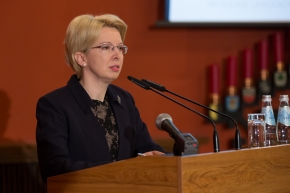 VideosGallery
VideosGallery
“For Latvia the Helsinki Accords of 1974 and the Helsinki Final Act of 1975 set historical processes in motion. The ten points in the Accords spoke about sovereign equality, respect for the rights inherent in sovereignty. They called for refraining from the threat or use of force, inviolability of frontiers and territorial integrity of states,” emphasised Ināra Mūrniece, Speaker of the Saeima, in her address at a conference devoted to the 40th anniversary of the Helsinki Accords organised on 24 April by the Saeima and the European Movement – Latvia.
“The renewal of Latvia’s independence was closely linked with the Helsinki Process, which was itself a sign of hope, attesting that the West does not accept the unjust geopolitical division created after World War II. The Helsinki Accords set clear principles. They had an immense effect on people behind the Iron Curtain,” said Speaker Mūrniece.
The Speaker of the Saeima emphasised that the goal of the Accords was to facilitate unity and sovereignty, human rights and fundamental freedoms, including freedom of thought, conscience, religion and belief. Groups of idealistic political activists began to actualise the Accords in the Baltic States in the mid-1980’s.
“I would like to thank Lidija Doroņina-Lasmane of the Helsinki 86 Group, who is among us today, for her human and civic courage in facilitating the renewal of Latvia’s independence,” said the Speaker of the Saeima.
Ināra Mūrniece emphasised that the principles of the Helsinki Accords have withstood the test of time and we need to keep upholding them in light of the new security challenges in Europe.
“Europe’s agenda contains the pressing issue of the conflict in Eastern Ukraine, as well as the protracted conflicts in Nagorno Karabakh, Transdniestria, South Ossetia and Abkhazia. There are too many hotspots in Europe and near its boarders. Therefore, we have to do our best to restore international order and to continue living in accordance with the principles on which we have agreed,” said Speaker Mūrniece. “The case of Crimea is a wake-up call. Europe should not deny that the occupation of Crimea may be Russia’s first step in a broader future plan.”
The Speaker of the Saeima attested that OSCE is a significant platform for pooling resources and joining efforts in the name of common goals: “OSCE tries to solve protracted conflicts, and there is no other organisation which could do that better. For years, OSCE has accumulated experience through missions.”
The conference was attended by Jo Leinen, Member of the European Parliament and President of the European Movement International, and it was chaired by Andris Gobiņš, President of the European Movement – Latvia.
In the first part of the event, Latvian freedom fighter Lidija Doroņina-Lasmane shared her memories and personal experience in the period prior to and after the signing of the Helsinki Accords.
The conference was concluded by Inese Lībiņa-Egnere, Deputy Speaker of the Saeima.
Forty years ago, on 1 August 1975, the Conference on Security and Co-operation in Europe, later the Organization for Security and Co-operation in Europe, was founded by signing the Helsinki Accords. Nowadays, together with the European Union, OSCE plays a key role in ensuring peace and security in Europe.
Saeima Press Service







